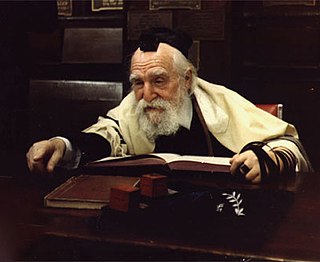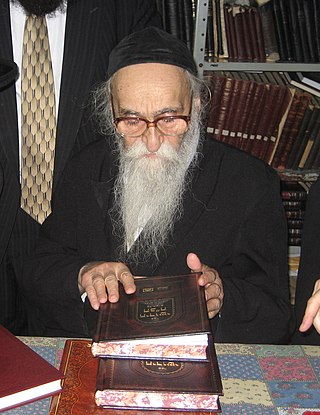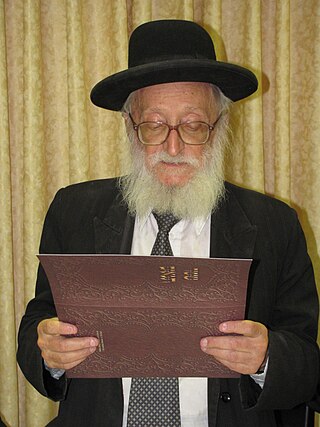
Rabbinic literature, in its broadest sense, is the entire spectrum of rabbinic writings throughout Jewish history. However, the term often refers specifically to literature from the Talmudic era, as opposed to medieval and modern rabbinic writings, and thus corresponds with the Hebrew term Sifrut Chazal. This more specific sense of "Rabbinic literature"—referring to the Talmudim, Midrashim, and related writings, but hardly ever to later texts—is how the term is generally intended when used in contemporary academic writing. The terms mefareshim and parshanim (commentaries/commentators) almost always refer to later, post-Talmudic writers of rabbinic glosses on Biblical and Talmudic texts.

Samson Raphael Hirsch was a German Orthodox rabbi best known as the intellectual founder of the Torah im Derech Eretz school of contemporary Orthodox Judaism. Occasionally termed neo-Orthodoxy, his philosophy, together with that of Azriel Hildesheimer, has had a considerable influence on the development of Orthodox Judaism.
Joseph Breuer, also known as Yosef Breuer was a rabbi and community leader in Germany and the United States. He was rabbi of one of the large Jewish synagogues founded by German-Jewish refugees fleeing Nazi oppression that had settled in Washington Heights, New York.

Modzitz, or Modzhitz, is the name of a Hasidic group within Orthodox Judaism that derives its name from Modrzyce, one of the boroughs of the town of Dęblin, Poland, located on the Vistula River.

Shimon (Simon) Schwab was an Orthodox rabbi and communal leader in Germany and the United States. Educated in Frankfurt am Main and in the yeshivas of Lithuania, he was rabbi in Ichenhausen, Bavaria, after immigration to the United States in Baltimore, and from 1958 until his death at Khal Adath Jeshurun in Washington Heights, Manhattan. He was an ideologue of Agudath Israel of America, specifically defending the Torah im Derech Eretz approach to Jewish life. He wrote several popular works of Jewish thought.

Yeshiva Torah Vodaas is a yeshiva in the Flatbush neighborhood of Brooklyn, New York.

Kol Torah is a yeshiva in the Bayit Vegan neighborhood of Jerusalem.

Moetzes Gedolei HaTorah is the supreme rabbinical policy-making council of the Agudat Yisrael and Degel HaTorah movements in Israel; and of Agudath Israel of America in the United States. Members are usually prestigious Roshei Yeshiva or Hasidic rebbes, who are also usually regarded by many Haredi Jews to be the Gedolim ("great/est") sages of Torah Judaism. Before the Holocaust, it was the supreme authority for the World Agudath Israel in Europe.

Rabbi Shimshon Dovid Pincus was an Israeli Haredi Rabbi of American origin, who served in Ofaqim.

Moshe Feinstein was a Russia born American Orthodox Jewish rabbi, scholar, and posek. He has been called the most famous Orthodox Jewish legal authority of the twentieth century and his rulings are often referenced in contemporary rabbinic literature. Feinstein served as president of the Union of Orthodox Rabbis, Chairman of the Council of the Moetzes Gedolei HaTorah of the Agudath Israel of America, and head of Mesivtha Tifereth Jerusalem in New York.

Meshulam Dovid Soloveitchik was a Haredi (ultra-orthodox) rabbi and rosh yeshiva (dean) of one of the branches of the Brisk yeshivas in Jerusalem.

Yehuda (Leo) Levi was a German-born American-Israeli Haredi rabbi, physicist, writer and educator. He was Rector and Professor of Electro-optics at the Jerusalem College of Technology. Levi was best known as the author of several books on Science and Judaism, and Judaism in contemporary society, as well as on physics.

Yehoshua Yeshaya Neuwirth was an eminent Orthodox Jewish rabbi and posek in Jerusalem. He was one of the primary students of Rabbi Shlomo Zalman Auerbach and the author of a two-volume Hebrew language treatise, Shemirat Shabbat Kehilchatah — translated into English as Shemirath Shabbath: A practical guide to the observance of Shabbath — a compendium of the laws of Shabbat which is viewed by many as an authoritative work regarding these laws.
Shmuel Yaakov Weinberg, known as Yaakov Weinberg was an Orthodox Jewish rabbi, Talmudist, and rosh yeshiva (dean) of Ner Israel Rabbinical College in Baltimore, Maryland, one of the major American non-Hasidic yeshivas. Weinberg was also a rabbinical advisor and board member in Haredi and Orthodox institutions such as Torah Umesorah, Agudath Israel of America and the Association for Jewish Outreach Programs.
Shemirat Shabbat Kehilchatah, also pronounced Shemiras Shabbos Kehilchosoh, is a book of halachah authored by Rabbi Yehoshua Yeshaya Neuwirth, which discusses the laws of Shabbat and Yom Tov, and is viewed by many as an authoritative work regarding these laws. Rabbi Neuwirth is a prominent student of Rabbi Shlomo Zalman Auerbach, and the book generally follows Rabbi Auerbach's opinions. The book discusses practical situations such as driving to a hospital on Shabbat in an emergency.

Sifrei Kodesh, commonly referred to as sefarim, or in its singular form, sefer, are books of Jewish religious literature and are viewed by religious Jews as sacred. These are generally works of Torah literature, i.e. Tanakh and all works that expound on it, including the Mishnah, Midrash, Talmud, and all works of halakha, Musar, Hasidism, Kabbalah, or machshavah. Historically, sifrei kodesh were generally written in Hebrew with some in Judeo-Aramaic or Arabic, although in recent years, thousands of titles in other languages, most notably English, were published. An alternative spelling for 'sefarim' is seforim.

Chona Menachem Mendel (Mendel) Weinbach was an Orthodox Jewish rabbi, educator, author, and speaker. As the co-founder and dean of Ohr Somayach Institutions, a Jerusalem-based yeshiva for newly-observant Jewish men, he was considered one of the fathers of the modern-day baal teshuva movement.
Dovid Kaplan is an Orthodox Jewish rabbi, kiruv educator, author, and speaker. He is known for his inspirational and humorous storytelling both in his international speaking engagements and in his Impact! series of books.

Tziporah Heller Gottlieb is an American-born Haredi educator, author, and speaker based in Jerusalem. She is a senior faculty member at the Neve Yerushalayim College for Women, principal of the Bnos Avigail seminary on the Neve campus, and a lecturer for the online Jewish college, Naaleh.com. She specializes in textual analysis of Biblical literature and Jewish philosophy, and exploration of the role of women in Judaism. The author of eight books, she is also a weekly columnist for the Hamodia newspaper.
Ruchoma Shain (6 December 1914 – 16 March 2013) was an American-born rebbetzin, English teacher, and author. She is best known for her first book, All for the Boss (1984), a biography of her father, Yaakov Yosef Herman, which she wrote in her late sixties. In detailing her father's life, she also describes Orthodox Jewish life in America in the early 1900s. All for the Boss became one of the all-time best-sellers for Feldheim Publishers, and Shain's stories and observations are quoted by numerous authors.















